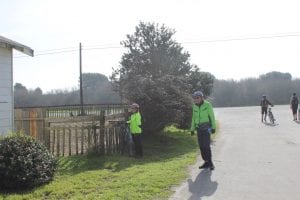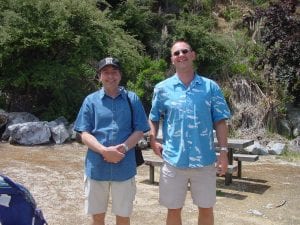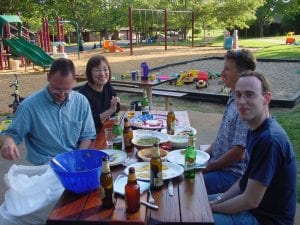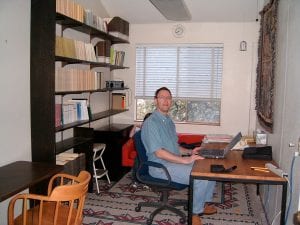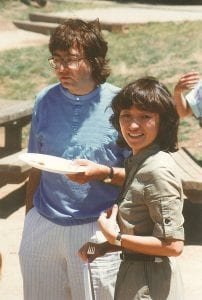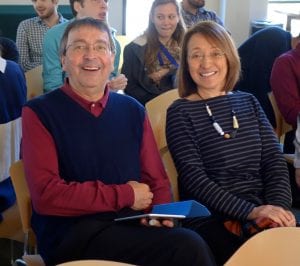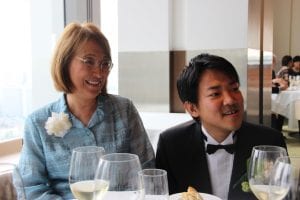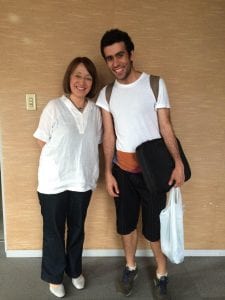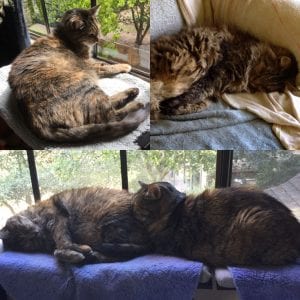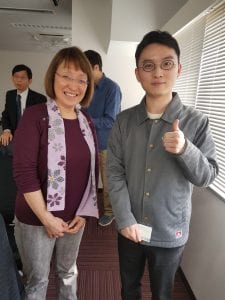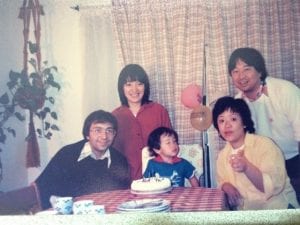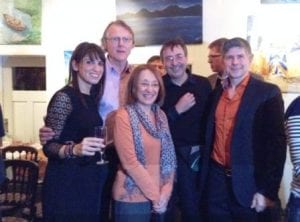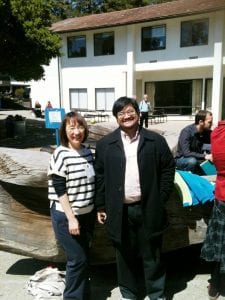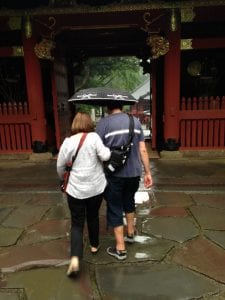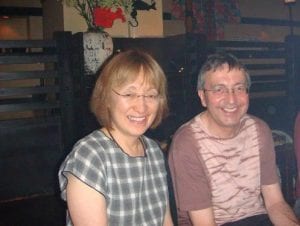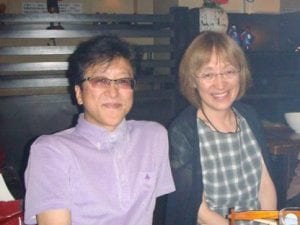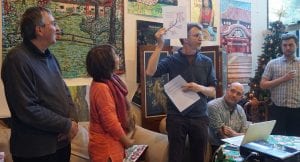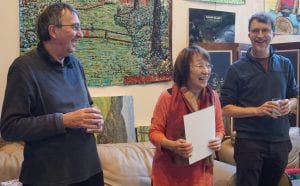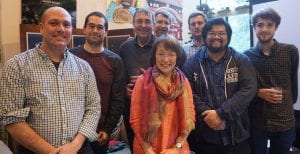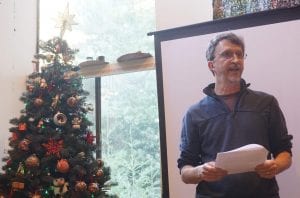Index
- Shigeru Miyagawa
- Maho Morimoto
- Akio Nasu
- Satoshi Ohta
- Jaye Padgett
- Ingo Plag
- Anthi Revithiadou
- Amanda Rysling
- Shin-Ichiro Sano
- Lisa Selkirk
- Shigeko Shinohara
- Jen Smith
- Yukiko Sugiyama
- Yu Tanaka
- Adam Ussishkin
- Tim Vance
- Rachel Walker
- Noriko Yamane
A haiku for Junko
Phono world nexus
Advisor extraordinaire
Me: grateful for life
A haiku for Armin
Diss seed mastermind
Phonologist nonpareil
Best questions ever!
Dear Junko and Armin,
As I reflect back on my time spent at the Department of Linguistics at UC Santa Cruz during the final half-decade before the turn of the millennium, it stands out to me as the most intellectually stimulating and personally satisfying time of my life. I knew immediately and instinctively during my campus visit in the spring of 1995 that UCSC was the right fit for me, and I never regretted my decision for a single moment. Much of that is due to the way you faculty were so welcoming and treated us grad students as colleagues right from the get-go and created such a warm, collegial environment for us to flourish in. And the phono milieu created by Junko, Armin and Jaye was second to none!
Armin, thanks for suggesting I pursue my Phonology B paper on secondary stress, even though I swore to myself that I would never, ever work on stress, much less make it the topic of my dissertation. And Junko, thanks for the countless weekly meetings while I was writing my dissertation, especially for “unsticking” me so many times and for meeting with me even when I hadn’t made much progress, because after meeting with you I always made progress. I learned so much from you both, not only about research but about teaching as well. The teacher that I am today was formed at UCSC and I pass that legacy down to my own students every day. And of course the research you both have done has inspired me and shaped the direction of my own research as well.
Thank you both also for the warm personal touch you brought to the department—the post-colloquia potlucks, meetings, and dinners at your house and also just for being so open and congenial. I couldn’t have asked for better advisors and I thank my lucky stars for the incredible good fortune of having had the opportunity to become a phonologist at UCSC.
Nothing but the best of the best (in the spirit of “tableau des tableaux” à la IMP 1995) to the both of you today and always!
With gratitude,
Dan Karvonen
伊藤順子先生・Armin Mester先生への感謝
私が初めて伊藤さん(たぶん原口先生と窪薗さんの影響でしょうが、私は、伊藤先生とMester先生のことを馴れ馴れしくも「さん」付けで呼ばせていただいてきました)とお会いしたのは、たしか、1992年に奈良で開かれた科研費関連の国際会議においてでした。そして、翌年の1993年に大阪外大で開かれたフォーラムのゲストがお二人で、まだ日本ではほとんど知られていなかったOptimality Theoryに関する講義を行ってくださいました。こうしてお二人と知己になった私は、お二人に受け入れ教員になっていただき、文部省の在外研究員として、1994年の8月から10ヶ月間、UCSCで過ごす機会を得ました。家族4人でサンタクルーズで暮らした日々は、「家族がもっとも幸せな時間だった」と今もよく家内や子どもたちと話します。
アメリカの学校は8月末から9月の頭にかけて始まるので、8月の後半になってから行けばよいものを、あの当時はきっと「早く行って慣れよう」とでも思ったのでしょう、私たち家族は早々8月10日ごろにサンタクルーズに到着しました。しかし、借りる予定だった家は8月20日ごろでないと空かなかったので、約10日間はホテル暮らしとなるはずでした。ところが、伊藤さんが、UCSCのHagar Courtにお住まいで、夏休みの間は日本に里帰り中だった社会学者の福来先生に連絡を取って交渉してくださり、なんと福来邸に1週間ほど泊まれることになりました。留守のお宅、それも、まだ一度もお会いしたことのないご家族のおうちを使わせていただくのは気が引けました。しかし、このことがきっかけで、福来ファミリーとは今でも親しいお付き合いが続いております。
そして、福来家に泊まっていたときだったと思いますが、ある日の夕方、伊藤・Mester邸にお招きいただきました。Hagar Courtの垣根のようなところを歩いて通り抜けてすぐのところの、Limestone Laneという通りに建つご自宅は、周りの木々とも溶け合ったように落ち着いた外観の、とても素敵なお宅でした。同じ時期にUCSCに滞在中であった経済学者の岸先生ご夫妻とご一緒に、眺めのよい北向きのウッドデッキで、BBQを楽しませていただきました。また、「日本のビールの方がよいと思ったので」と、わざわざヤオハンでサッポロ黒ラベルを買って来てくださっていたお気づかいも大変ありがたかったです。Limestone Laneという通りの名前のとおり、石灰岩の岩肌が周りに少し見えていた気がしますし、その向こうには草原と森が広がり、海も見え、素晴らしい景色にとても癒されました。
記憶をたどって思い出を綴り始めると切りがありませんが、伊藤さん・Mesterさんのお陰でこのように始まったサンタクルーズでの生活は、その後の私と私の家族の人生を、よりよい方向へ導く大きなきっかけになりました。伊藤・Mester家のリビングに飾ってあった99頭の馬の絵画の前で、BBQのお礼にと、ギコギコとバイオリンを弾いた息子(当時7歳)も、あれから24年が経ち、すっかりおじさんになりました。そして息子は、父親の(悪?)影響およびアメリカで見聞きしたことも動機となって、心理言語学の研究者になりました。まだ幼稚園児で、とてもシャイだった娘は、アメリカで大柄な黒人のお姉さんに話しかけられたりすると、怖がって泣いたりしていました。ところが、日本に戻ってからは、外国の人や障害がある人たちにも、まったく分け隔てなく接する者となり、医者となった今も同じです。これは、サンタクルーズの幼稚園で過ごせたことが大きく影響していると思います。家内は、サンタクルーズの隣町のアプトスにあるCabrillo Collegeに通ったことで、自信や経験が増し、帰国後は語学教師としての幅が大いに広がりました。そして、私にとっては、サンタクルーズ滞在中に、UCSCの言語学の優秀な先生方や大学院生の皆さんだけでなく、Trilateral linguistics Weekend (TREND)でUC BerkeleyやStanfordの著名な先生方と接することができたことや、LSA Annual Meetingなど各種の学会に出席できて、日本人の優秀な研究者の方々とも知り合えたことは、一生の宝・誇りになりました。
最後に、私がお二人の論考で一番影響を受けたものに触れます。それは、日本語の語種によって音韻制約のかかり方が違うことに基づいて提案されたレキシコンのcore-periphery構造です(1995年の論文)。もっとも日本語らしい和語ほど多くの制約がかかるという捉え方は実に興味深く、かつ分かりやすいので、私の学生たちにレキシコンの話をするときには、いつも必ず紹介しています。他にも、私のゼミ生には連濁や短縮語について卒論を書く学生が多いので、彼ら・彼女らにとっても、伊藤さん・Mesterさんの論文は必読文献の一つとなっています。
これからも、音韻研究の魅力と奥深さを発信し続けて、多くの(若手)研究者の興味を引き付けてください。
太田 聡 (Satoshi Ohta)
Dear Junko & Armin,
Thanks a lot for being wonderful hosts during my time in Santa Cruz and a constant source of inspiration throughout my development as a phonologist!
All the best for your future plans
Martin Krämer
Junko and Armin burst onto the scene when I was still a young assistant professor, and it has been a real joy to watch them work so tirelessly to help us all understand Japanese phonology better. The fact that they’re such genuinely nice people is a huge bonus. They make the rest of us feel that we’re all in this together.
Tim Vance
I remember very well when I met Junko for the first time. It was at the annual CLS meeting in 1990, where she gave a plenary lecture at the special session on syllable structure. I had already known her by name, but that was the first time that I had actually met her in person. I remember talking with her about Japanese phonology and other things at this meeting. After this conference, I began to exchange emails with her and, quite naturally, got acquainted with Armin soon after.
Junko and Armin came to see me in Osaka and Kobe every time they came back to Japan in 1990s and 2000s. They actually attended many workshops and conferences in Japan and gave numerous interesting talks in these events and stimulated Japanese scholars, both young and old. We were particularly attracted by their insightful theoretical analyses of many phonological phenomena that we were already familiar with.
Over the past thirty years, I worked with Junko and Armin quite intensively on several occasions. In 1994-1995, I spent one year at UCSC as a Fulbright scholar. This was not only a fruitful year for my academic career but also a very happy year for my whole family as they enjoyed their American life in Santa Cruz very much. My three children were only six, four, and two years old at that time—they are aged 30, 28, and 26 now!—but they still have fond memories of their life and friends in California. As for my career, I enjoyed attending Junko and Armin’s graduate seminar every week. I came to know many people there including Jaye Padgett, Ove Lorentz, Jason Merchant, Chris Kennedy, Rachel Walker, Philip Spaelti, Kazutaka Kurisu and Motoko Katayama, among others, most of whom were graduate students then. My collaboration with Junko and Armin during this year-long visit led to several joint talks/papers including ‘Nonfinality in Japanese phonology’ (Proceedings of the 16th International Congress of Linguists, Paris, 1997) and ‘On’inkoozoo-kara mita go-to ku-no kyookai’ (Speech and Grammar, 1997, Kurosio Publishers).
Since this collaboration, Junko and Armin began to visit me in Japan more frequently, spending almost a year in Japan in 2001-2002 and 2006-2007, for example. My collaboration with them on these occasions led to the paper ‘Consonant gemination in Japanese loanword phonology’ (Proceedings of the 18th International Congress of Linguists, Seoul, 2008). Our collaboration continued even after I moved from Kobe to Tokyo in 2010 as Junko and Armin began to spend several months every summer with me at NINJAL (National Institute for Japanese Language and Linguistics) where I work. Their visit to NINJAL is now an annual event which I look very much forward to. Our discussion of consonant gemination led to our new joint paper ‘A prosodic account of consonant gemination in Japanese loanwords’ (The Phonetics and Phonology of Geminate Consonants, Oxford University Press, 2017). Moreover, Junko and Armin contributed two excellent papers to the handbook that I edited, The Handbook of Japanese Phonetics and Phonology (De Gruyter Mouton, 2015). Over the past two years, we have been working together on the phonological structure of Kattobase, an interesting chant used by Japanese baseball fans.
Time flies! It is hard to believe that it is already nearly thirty years since I became acquainted with Junko and Armin. But I do hope that my collaboration with them both in private and academic life will continue in the next few decades to come. I wish them good health and happiness!
Haruo Kubozono
Dear Junko and Armin,
Congratulations for having reached the point where you can look back at careers that have been so deeply influential to the field, both through your own work and through the work you’ve inspired. At the same time, you can look forward to a period — hopefully a long one — in which you continue to do the things you love to do, and maybe some new things, too.
To the many good memories of times together in the past — cold soba noodles on a hot day in Tokyo, the SF opera, sharing pizza in Santa Cruz and, of course, years of collegiality — here’s hoping we can add some more in the future.
Warmly,
Judith Aissen
Fond memories of Junko and Armin
I believe I first met Junko and Armin during their visit to Marburg (Germany) in 1998. At the time I was working on my Habilitation and their work was a great inspiration for me. Later, when I had my first sabbatical semester as a professor in 2004, my family and I spent the spring and the summer in Santa Cruz, which turned out be the perfect spot for this adventure. My children loved their childcare, the schools and their new peers, my wife enjoyed life so close to the sea (and the whales), and I was very happy with the department I had come to visit as ‘research associate’. Junko and Armin made me feel at home right away, and we had a lot of fun together, both at work and beyond. Junko was chair of department at the time, and even let me have her office all by myself. There was no other space available, and she said she didn’t really need it… We had a wonderful time, and I have very fond memories of the five months I spent in Santa Cruz. It took us until 2017 to return (this time for a vacation), but when we did, everything seemed just as nice as 13 years before. Junko and Armin gave a very interesting talk, and they were still the wonderful people they had been all along in my memories.
All the best, Junko and Armin!
Ingo Plag
Ito 先生、Mester 先生と私
伊藤先生、メスター先生、感謝してもしきれません。私の言語学との出会いの最初期から現在まで先生方の著作に大いに励まされ、導かれてきた思いです。
私が言語学に出会ったは、学部の1年生1982年ICUのキャンパスでした。ICUを選んだのは、英語が勉強できる良い環境がICUに整っていると漠然と思ったからでした。学部の1年の時に先輩達が開いていた言語学の勉強会 (Lingoというのがその名前)に出会い、当初は生成文法の統語論に興味を持ち、井上和子先生の本など読んでいました。
音韻論に取り組むようになったのは、学部の3年の冬学期(1984年-1985年)でした。先輩の立石浩一さんに誘われて、村木正武先生が開講していた大学院の音韻論の授業に参加したのでした。Shane の Generative Phonology が教科書でした。
その授業のタームペーパーで取り組んだのが、漢語の音韻論。McCawley (1968) (The Phonological Component of a Grammar of Japanese) の中で、日本語の漢字の音読みの音形には、限りがあること、つまり、大きく分けて、 (1) 1モーラ1音節、(2)2モーラ1音節、(3)2モーラ2音節の3種類あり、2モーラ2音節の音読みはさらに細かく分けると(3a)/ki/で終わるもの、(3b)/ti/で終わるもの、(3c)/ku/で終わるもの、(3d)/tu/で終わるものの4種類あるというが書いてあります。自分で漢和辞典で調べてみると確かにそうでした。
McCawley によれば、「きちくつ」で終わる音読みには、さらに興味深い特性があります。そうです。ご存じのように促音化するのです。カ行の「きく」で終わる場合は、カ行で始まる漢字が後続するときに限り促音化し、タ行の「ちつ」で終わる場合は、タ行、カ行、ハ行(パ行)、サ行で始まる漢字が後続すると促音化します。ウ段の「くつ」で終わる場合は、ほぼ、例外がありませんが、イ段の「きち」で終わる場合は、促音化しない場合が多くなります。このことを、規則として捉えてみようと思ったわけです。
さて、当時、Underspecification Theory が流行っていました。Kiparsky (1982) や Archangeli (1984) などを参考に、さらに、外来語の場合、/i/や/u/や/o/が挿入されることなどもヒントに、日本語の漢語では、母音は/u/が、子音は /t/がデフォルトの分節であると考えることにしました。例えば、「物」は、/buC/(Cはデフォルト子音)、「悪」は、/ak/の子音終わりを基底表示とします。(実際は、自律文節音韻論的な表示を用いました。)前者には、無声阻害音(/t, k, p, s/)が後続した場合、後者には、/k/が後続した場合に、促音化する(連続した子音が素性を共有する、素性がスプレッドする)と考えることにしました。ただ、このタームペーパー、現象の細部にこだわりすぎたきらいがあり、要点がわかりにくくなっています。また、理論的な仕組みの扱いも雑でした。このタームペーパーは、先輩の立石さんに見ていただき、立石さんのオリジナルのアイデアも取り入れられ、立石さんの論文となります。出版されたのは、1990年のようですが、それより前に、伊藤先生のところにも届いたのではないかと思います。
この漢語の現象は、伊藤先生の博士論文で prosodic phonology の枠組みの中で、きちんとした定式化が行われたことは、皆さんよくご存じのところです。私が大学院生になり、Ito (1986, 1988)を読んで、自分では、うまくできなかった定式化がすてきな形でしめされていて、とても感動したのを覚えています。
その後、1999年9月から2000年9月までの1年間、UC Santa Cruz で過ごす機会をえました。この1年は、私にとっては、素晴らしいものでした。ICUからの交換留学生として、川原繁人さんがいらっしゃいましたし、また、大学院生として、栗栖和孝さんも勉強していらっしゃいました。Santa Cruz の素敵な自然と天候のなかで、1年間を過ごせたのは、本当によかったです。伊藤先生、メスター先生の授業にも参加させていただきましたし、いろいろな勉強会にも顔を出させていただきました。うちの人が日本から遊びに来たときには、自宅に呼んでいただき、お食事をさせていただきました。
その後も、学会でお目にかかりる度に親しくお話をさせていただき、とてもうれしく思います。お二人の論文に触れる度に、自分ももっといろいろなアイデアを形にしていかなくてはと、奮い立たされるのですが、なかなか、お二人のようにはまとまりません。
これからも、私たちに大いに刺激を与えてくださることと願います。
本間猛 (Takeru Honma)
Junko and Armin,
Thanks for your support in grad school and beyond. Enjoy your well-earned retirement!
Aaron Kaplan
As I look back on life in Linguistics after eight years of retirement, I am so grateful for my meaningful and valuable relationship with Junko. Junko and I went through the trenches of operating a department, and I learned so much about clarity, negotiating, and fairness from her. I also learned how valuable it was to have a true friend and supporter as a Chair. Her ability to parse difficult situations and come up with logical solutions was always so impressive. Her calmness and willingness to always be there to brainstorm with me made every difficulty much less intimidating. Junko’s forward thinking plans about this great department started many years ago and her impact on the future of Linguistics at Santa Cruz is immense. I am so very lucky to have worked with her and share such a great bond and friendship.
Armin and I also shared “fun” times with administration in Linguistics. As my faculty graduate advisor, Armin and I interacted daily about the many issues that needed attention with graduate students. So many matters become emotional and very hard to remedy when you are dealing with such an intense time in student’s lives. So many times, even when Armin wasn’t the graduate advisor, I ran down the hall to ask his opinion, and seeking his counsel was the reason I made a wise decision. His pragmatic advice, sound judgment, and generosity will always stand out to me. He also makes amazing tempura!
Junko and Armin’s welcome invitations to their home and the many delicious meals they’ve cooked are unforgettable. Thank you both for always making me and my family feel so welcome!
Tanya Honig
My first job after grad school was a visiting position at UCSC, and so Junko and Armin had a big influence on my development as a linguist. Not only did they generously share syllabi and teaching materials — some of which I still use, years later! — but they provided sage advice and inspiration. Two particularly vivid memories: Junko’s counsel to “fasten your own oxygen mask first,” that is, to be sure to keep developing as a researcher in order to be an effective teacher. And Armin’s interest in and great enthusiasm for so many topics, which has been an inspiration for me to keep remembering, in the thick of the day-to-day chaos, that linguistics is fun.
Jen Smith
Nearly 20 years ago Junko was Chair of the Linguistics Department and helped to hire me, along with Tanya Honig — for which I will always be incredibly grateful! The fact that she is once again Chair, and I’ve progressed to become Department Manager feels like we’ve come full-circle; I would certainly not be where I am today without her guidance, support and mentorship! Both Armin and Junko have tremendous hearts, caring deeply about everyone affiliated with our department — I’d like to thank them for so many years of stewardship and energy!!
With my warmest wishes,
Ashley Hardisty
Dear Armin and Junko,
I got your hand-me-down filing cabinets in graduate school, and we must have talked at the Linguistics Institute at UC Santa Cruz in 1991. But the earliest memory I have that portended a career together is of asking Junko whether I should bother applying for a job at UCSC. They wouldn’t want a third phonologist, right? Luckily for me, they did. Fate could easily have landed me somewhere else without phonology colleagues, but instead I got to work with you.
Back then, just a few years out of graduate school, you already had seminal articles to your name. Your famous Linguistic Inquiry paper on compound voicing in Japanese was written while you were still in graduate school. And there is that beautiful article published in Language in 1989, about Japanese palatalization and underspecification. In those days there was a fascinating dialog going on in the field about underspecification. Underspecification isn’t talked about much today, but this dialog was really about how the contrastiveness and markedness of features shapes a language’s phonology. This is a question that remains as important today as ever, and your article defined one prominent point of view: that contrastiveness within the language is what matters. Your work is timeless in that way. And it presents, and defines, the important issues with unmatched clarity. I’ve been assigning your papers in class for decades.
A collaboration as close and fruitful as yours reminds me of Lennon and McCartney. In this metaphor, I only hope that I’m at least George. As I think about the qualities of your work, I see another way in which the Beatles reference is right. Like most people, I believe the members of the Beatles did their very best work together, not after they had separated. Maybe this was a matter of competition among them. I like to see it in a more positive way: around greatness we are inspired to be the best we can be too. I want you both to know that, if I had not had you as colleagues to look up to, I’m sure that my own work, and career, would not have been as good or interesting. I want to thank you for that.
I treasure the papers we have written together. Let’s do that some more.
Jaye Padgett
It is so exciting to be a part of celebrating Junko and Armin. As an undergrad, discovering that they were both at UCSC was an important part of what excited me about applying to do a PhD there. Both of them have been important to my career in many ways, especially with respect to how I’ve developed both as a teacher and a researcher. I think the common theme in both of these areas that influenced me the most was the high degree of care and thoroughness they apply to their work, especially their lectures, their student evaluations, and of course their analyses. From them I learned, among many other things, the intricacies of both Icelandic and Japanese phonology, both of which helped shape my early work in the field. I wish them the very best, now and always.
Adam Ussishkin
Junko and Armin published their LI monograph in 2003, which analyzed many morphophonological patterns in Japanese in elegant ways. I was a second year graduate student at UMass, who was aspiring to become a theoretical phonologist with main interests in Japanese. Having read their LI monograph, I felt that I should probably pursue a different line of research in order to become something other than “mini-Ito-and-Mester”. Now I mainly use experimental methods to explore phonological and phonetic issues—their LI monograph was one factor that determined my career. Their influence is still persistent: I often find myself thinking “how can I test Junko and Amin’s theory with an experimental method?”
I was lucky enough to have personal interactions with Junko and Armin. One fond memory that I have of them, of which there are many, is the “which-paper-by-Ito-and-Mester-is-your-favorite-game”. Junko and Armin gave a talk at Keio, and we had dinner afterwards. Jason Shaw and a student of his were there. The student was/is working on ranuki, and she said she was inspired by their 2004 paper. Jason has worked on the learnability of lexical strata in Japanese—clearly, Jason’s favorite is their 1995 paper. Mine was/is their 1986 LI paper on rendaku and Lyman’s Law. It simply shows that Junko and Armin keep inspiring young researchers with different interests, as they keep offering theoretically interesting and insightful analyses using a wide range of phenomena.
Shigeto Kawahara
Some random pearls of wisdom from Junko and Armin
I remember one afternoon sitting in Junko’s office discussing a paper that I was working on about stress and syllabification in Ho-Chunk (a.k.a. Winnebago). I was trying to link up syllable structure with the stress system in a new way, and a lot hinged on the treatment of internal CC clusters. But the analysis was only successful if I distinguished sonority generalizations on onset CCs and heterosyllabic CCs, and employed a kind of tailor-made language-particular sonority scale. I was pulling my hair out trying to make all of these pieces of the analysis fit together in a satisfactory way, and it didn’t look like it was going to happen. I remember Junko stepping away from the minutiae of the handout and saying, “You know, John, you don’t have to have an analysis of everything”. The meaning being, focus on what you want to explain, and build your analysis around that. If you can just do that, you’ll be okay. Sometimes you need special purpose assumptions to get things to work, and sometimes there are exceptions, but that’s par for the course.
I hear myself repeating this statement to my students sometimes when I see they are getting too bogged down, and even to myself when I’m working on new projects. I think there are always times when we want to let our intuitions run free, and we need to attend to everything we see. But to make progress on a problem, one needs to establish a clear objective and maintain a strong focus on it when making decisions about how to connect pieces of data and what to emphasize and what to let go of. This was just a brief conversation at an early stage in my career, but it has been tremendously influential to me because as I look back at my work in the last twenty five years, there’s a pretty good correlation between having a clear agenda and being successful.
Which leads me to another subtle observation I remember from my UC Santa Cruz days. As a TA, I would go to the brown bag series on best practices in teaching. Things like the chalk board techniques lecture that Jorge is famous for, linguistic argumentation, and how to get students to talk. I remember sitting in one of those meetings and talking about how to comment on written homework assignments, and in particular how to steer students in the right direction when they are kind of off base. The simplest way, one person said, to put on the brakes and set them on the right path is to find an exception to their solution and make a direct statement like, “How does your analysis account for X?”. At that point Armin chimed in and made a really interesting point, which is that often students do not propose the state-sponsored analysis, but they do account for some of the data, and more importantly, they also identify the ‘exceptions’ that don’t fit with their analysis. The point being the student should get some recognition for finding exceptions and recognizing that their analysis didn’t account for all of the data. That after all is what matters, proposing theories, testing them out on facts, and being honest about how it accounts for those facts.
Following Armin’s example, I always give credit to students that point out problems with their solutions, but I sometimes wish more of my colleagues in the field would do the same. Are there any analyses out there without data that don’t fit? How often do you see complete analyses in published work that both propose a compelling solution, and then go on to show how it can be extended with straightforward modifications to grapple with the exceptions. In my experience, it is rather rare, and that’s too bad because the analysis of exceptions is a wonderful way of teasing apart differences between alternative approaches. Perhaps if we all start following Armin’s practice, treatment of exceptions and other recalcitrant data will become more prevalent.
Though I only had a few brief quarters to learn from Junko and Armin, these two pearls of wisdom, easy to miss in the day-to-day hustle of graduate student life, combine for me in a powerful way. Have a focus and maintain that throughout an investigation. When you write your paper, it is generally better to write it in a way that maintains strong focus. In other words, it should be about the big burning question that aligns with your focus, and not engage casually in side points and sub-themes. In doing so, one naturally runs into facts or issues that don’t quite fit and that have to be acknowledged as you charge through with the burning question. But then these side issues can lead to a better understanding of the correct analysis and even new investigations down the road.
John Alderete
Dear Junko and Armin,
Congratulations! I hope this next chapter of your lives will be fruitful and fun.
All the best to both of you,
Donka Farkas
When I was an undergrad in Brazil, the first paper on Japanese Phonology that I read was Ito and Master’s seminal 1995 paper (“Japanese Phonology”). I had the amazing opportunity to attend one of their lectures organized by Prof. Shigeto Kawahara at Keio University when I was living in Japan, where this picture was taken (Summer/2014).
Marco Fonseca
Dr. Ito and Dr. Mester,
So many articles you published and so many lectures you gave influenced me, and especially “Japanese phonology: constraint domains and structure preservation” published in 1993 amazed the field with your new idea about strata-specific constraint-based phonology. At the time I just started to study Japanese phonology, and I was so lucky to have been at your lectures you gave everywhere such as The Phonological Society of Japan, Tsukuba Circle of Phonologists, and Phonological Association in Kansai, and was inspired at your cutting-edge ideas and the dynamic presentations. I was also excited at your manuscript “Correspondence and compositionality: The ga-gyō variation in Japanese phonology” (1996) that you handed to me, and that made me think a lot about the place markedness of velar nasal and the systematicity of segmental sound changes. Thank you so much for sharing your academic passion, constant leadership, entertaining performance, and friendly and sincere advice.
With sincere good wishes,
Noriko Yamane
Dear Armin and Junko,
Thank you for all the inspiring work on German, Japanese and other languages. And thank you for the weeks spent in Tübingen so many years ago, for your classes, and your wonderful contribution to the conference. I enjoyed your knowledge and friendship, and so did the colleagues there. Ede and I are looking forward to meeting you again soon.
Caroline Féry
Dear Armin and Junko,
In your work you have shown that binarity can be optimal in prosodic structure, but you have also shown by example that it can be optimal in prosodic research. Like the perfect prosodic word that you have characterized, you two make the perfect prosodic team. From you I have learned that harmony can truly be achieved in phonology, even when there is underlying duality.
Your work has always been inspiring to me in its simplicity, creativity and elegance. I’m so excited to see what new ideas emerge as you find yourselves free to wholly focus on whatever captures your interest.
I wish you much, much happiness in the years to come,
Rachel Walker
Dear Junko and Armin,
First, I would like to acknowledge how easy you made my transition from Mitaka to Santa Cruz, and how my MA thesis could not have been written without your help and the warm snuggles of Misty and Molly.
It has been an honor to work as student and TA of yours, and thank you for all that I learned and will learn from you and your work.
Best wishes!
Maho Morimoto
Dear Junko and Armin,
It is difficult to overstate how important you were to my early (earliest!) development as a linguist, and also how important your work has been to development of our field. At the possible risk of understating it, I want to say just a few words about each here.
First, speaking personally. As great as the UCSC Linguistics program was when I was there as an undergrad (1989-1993), and as much as I took advantage of all that it had to offer, I am certain that I wouldn’t have felt capable of pursuing the path that I did had it not been for the instruction, advice, and encouragement that I received from both of you. Your good example has been a guiding principle for me ever since. If I’ve never acknowledged and thanked you for that before, I sincerely apologize, but here it is now: thank you!
Second, speaking more broadly. Your work, both independent and collaborative, has shaped many basic assumptions in phonological theory — so much so that sometimes I worry that it is at risk of being taken for granted. Just to highlight three examples:
- Junko: your work on prosody and syllabification is an absolute baseline assumption for virtually all viable theories of (the effects of) syllable structure. I cannot teach or point to Chapter 6 of Prince & Smolensky (1993) without also pointing to your 1989 NLLT article.
- Armin: your work on metrical theory clarifies the interactive role that metrical constraints play in shaping the prosodic structure of a language. I cannot teach or point students to Chapter 4 of Prince & Smolensky (1993) without also pointing to your 1994 NLLT article.
- Junko and Armin: your work on Japanese morphophonemics, culminating in your 2003 MIT Press book, shows how deep work on a single language can have far-reaching implications both for linguistic theory and for the analysis of other languages.
If your retirement is half as successful as your careers have been, it’ll be a very happy one!
A final personal note. When we began planning for the 2018 Annual Meeting on Phonology here at UC San Diego, I was thrilled when — without any influence from me, so far as I could tell — our organizing committee nominated and voted for you both to be among our invited speakers. I can’t wait to say some of these same words to the AMP audience when I introduce your talk.
With deepest appreciation, affection, and admiration,
Eric Baković
Dear Junko-sensei and Armin-sensei
As a phonologist, I grew up with your research, starting with your dissertations. Since my graduate advisors, Linda Lombardi, Paul Smolensky, and Laura Benua had always mentioned you two and let us read your research, you two were leading my graduate study before I directly met you. From your work, I learned how to organize the phonological research; how to propose new ideas; and how to argue phonology as well as how phonology is exciting. You two have been always my heroes. My first conference presentation was at Santa Cruz, WECOL 1996. I was of course so nervous then, and could not handle Q & A period well. Armin-sensei kindly helped me and I successfully answered to the tough questions thanks to the help. After my presentation, Junko-sensei came to me and told me “Well-done!” I was so touched since my heroes led me to the successful conference debut. Since then, for more than 20 years, Junko-sensei and Armin-sensei have always been giving me tremendous amount of invaluable advice regarding phonology, linguistics, and philosophy. You two joined Meikai OT conference in 2001 which Mafuyu and I first organized, and gave the wonderful and entertaining presentation. Without your help again, the conference could have never succeeded. In the same year, Mafuyu and I were invited to a conference in Korea with you two and Haraguchi-sensei, it was so a memorable event. I cannot stop when I try to express my appreciation to you two because whenever I saw you two or read your research, I received encouragement to live a better, happier, and deeper life. Thank you very much for your great support toward me all the time, and congratulations on your festschrift. I would like to learn from you two more and more as a phonologist and as a person. I wish your happiest days from now on, too.
Haruka Fukazawa
I fondly remember the key role both Junko and Armin played as mentors in my understanding of phonology. Their quality teaching, personal encouragement, time spent discussing potential analyses of challenging data, and help in the presentation of data were not only outstanding, but a clear example of how to perform these tasks at a high level.
May your coming days be filled with reflections on the marvelous nature of human speech and the gift that it is.
Andy Black
Ito先生・Mester先生から直接ご指導をいただいたことはありませんが、日本語の語彙層問題に関するご研究をはじめ、数多くの論文を拝読させていただきました。特に2016年のUnaccentedness in Japaneseから大きな影響を受けており、今自分自身の研究の理論的な土台となっています。著者の両先生に敬意を表し、心から感謝申し上げます。
李 墨彤 (Motong Li)
I am very grateful both to have had Junko and Armin as professors and to have TAed for each of them. I started graduate school expecting to be a syntactician and it was no small part the joint powerhouse of Junko and Armin’s phonological analysis and teaching that drew me toward phonology. I feel very privileged to have worked with them.
While I was TAing Phonology I for Armin I asked him a lot of questions about autosegmental phonology and his willingness to explain and discuss the old ways improved my understanding of pre-OT phonology in leaps and bounds. I smile whenever I remember how he would pick up a stick on his walk across campus to use as a pointer in class!
I will always be grateful to Junko for her willingness to accommodate me when I was pregnant and expecting near the end of winter quarter. She arranged for a second grader to be put on her Phonology II course I was TAing, and taught section for me the week after I gave birth.
Thank you both for all that you gave UCSC’s Linguistics program, and all the support and knowledge you gave and shared with me.
Anya Lunden
Dear Junko and Armin,
What wonderful careers you’ve had, together and separately. Your collaboration has benefitted people across subfields of linguistics – to name a few, phonology, Japanese linguistics, and syntax.
I happen to be familiar most with your work in the phonology of Japanese, and I know for a fact that you’ve made indelible and far-reaching contributions that brought us a long way in understanding the sound system of the language. Aside from phonology, the Grimshaw and Mester LI article (1988) has made a huge impact on our understanding of the light-verb construction in Japanese. It led to works by a large number of linguists on the topic, including my own on unaccusativity in Japanese.
For me personally, it’s been a treat to spend time with you in Japan. The sushi dinners, the wonderful get together at your Chofu condo, and the conferences we helped to organize at the International Christian University have all been a way to get to know you better and to have fun in our “the other” country.
I look forward to more of the same.
I wish you the best,
Shigeru Miyagawa
Ito先生、Mester先生
I wish you all the best and a lot of happiness for your further life!
Yukiko Sugiyama
Junko and Armin,
It has been such a pleasure to know and work with you both over the last few years. You have both been wonderful professional role models for me—you’ve influenced the way I approach problems, the way I develop and present an argument, and the way I explain complex concepts to undergraduates. Additionally, your warm and positive attitudes have helped keep me from getting discouraged when confronted with challenges, and have made working in our department a pleasure. Congratulations to you both!
Andrew Hedding
We all know that Junko and Armin’s research has long been at the cutting edge of the theory of phonology. What I find even more praiseworthy and pleasant is that it has always started out with a very fundamental and naïve wonder about language and has consistently come back to it in the end without being trapped in the swamp of linguistic technology.
Thank you for having been such inspiring and congenial friends to me and my family all these years, which I hope will continue for many more years to come.
Yoshihisa Kitagawa
Dear Junko and Armin,
It’s being one of the greatest pleasures to get to know you both, first, as a visiting student at Santa Cruz (spring semester 1997) and later on as a host of OCP4 in Rhodes (2007). I am also deeply indebted to Junko for accepting to serve as a Referent to my doctoral thesis in 1998, during a very trying time for her.
“Junko, I will never forget your dedication and generosity.”
I know of no other way to express my feelings, thoughts and gratitude to both of you but through these three (ω-compound!) words from my own tongue: μεγαλοψυχία, ταπεινοφροσύνη, αέναη διανόηση.
Thank you both for being the truly amazing teachers/scholars/human beings that you are.
Best wishes,
Anthi Revithiadou
90年代に博士論文の準備をしていた頃、ちょうど音韻理論がNon Linear Phonologyを経て派生から制約理論への移行期で、次々と発表される論文を読ませていただいていました。韻律構造とセグメントのマッピングの論証などに影響を受けて、日本語ピッチアクセントのデフォルト位置の分析などに応用させていただきました。そんな理論的な部分よりもっと大切なことは、辞書に載っていない身近にある話し言葉のデータを自分で探してきて分析する楽しみを正当化してもらっていたことのような気がしています。
Shigeko Shinohara
Sometime around 2010, Junko gave a talk at NYU that I was very upset that I couldn’t attend, and Maria Gouskova asked Junko to autograph a handout for me. I was thrilled; I still have it. Junko and Armin’s work had already been crucial to my discovering the phonological topics—the nature of segmental representations, voicing assimilation, the treatment of lexical strata or exceptions—that drew me to this part of the field.
My admiration for Junko and Armin was a large part of the reason that I didn’t apply to UCSC for grad school. I knew that UCSC didn’t hire their own PhDs, and I was so certain that I wanted to have a serious chance at working here, that I would rather go to another school first. It sounds so cheesy that it’s rather hard to admit out loud, but it’s not a coincidence that I picked Junko and Armin’s alma mater.
Getting a job is lucky and magical no matter what. But when the person you first talk to at that school, who’s in charge of all the administrata for that search, is one of your heroes, I think there’s a special thrill at each step. Knowing that people you’ve esteemed forever helped to choose you definitely helps to fight the inevitable imposter syndrome. Knowing that they’ll be somewhat disappointed if you don’t file by your deadline really helps keep those revisions going. And remembering every day that you now help with the stewardship of a program that they painstakingly constructed is humbling, inspiring, and overwhelming in a wonderful way.
So I need to thank Junko and Armin for being an inspiration—for their contributions to my favorite parts of the field, for setting up a fantastic place to work, and for their examples of mentorship and scholarship.
Amanda Rysling
I will always remember how kind and warm Junko and Armin were when I first arrived at UCSC to begin my PhD 21 years ago (!). But mostly, I will always remember their warmth and kindness the whole of the five years I was there.
Dear Junko and Armin: I wish you both all the best in this new stage of your careers, hoping that it will be as successful and pleasurable as everything that has come before it. All the best from Mexico City.
Rodrigo Gutierrez-Bravo
To Junko and Armin, thank you // Gracias, Junko y Armin
Generalmente, los fonológos más inteligentes
Representan, a la más buena gente.
Armin y Junko no son una excepción:
Conmigo fueron muy buenos
I por eso, de corazón, yo siempre se lo
Agradezco.
Santa Cruz me acogió
Justo hace seis años hoy
Un año extraordinario, sin
Nieve,
Kon mucho sol, fonología, olas y prosodia…
Otro año me gustaría volver
Y a Junko y Armin volver
A ver, disfrutando de la vida, siempre con una
Risa.
Mis fonólogos,
Inspiradores y buenos mentores,
Nunca os olvidaré
Thank you for lightning my path during my PhD, making my time in Santa Cruz a wonderful experience and travelling all the way up to Tromsø for my defense (right in the middle of the darkest period…).
I wish you all the happiness for this new stage in your life!
And remember you are always welcome to Valencia 🙂
Violeta Martínez-Paricio
Dear Junko and Armin,
It’s hard to say exactly how much you both have helped me along my journey through the linguistics program at UCSC. I’ve had the unique opportunity of having both of you as professors in undergrad, and having these relationships continue into my graduate career.
Armin, as an undergrad in your Phonology 1 class I was very glad that I had such a lively, humorous, and knowledgeable instructor. Happily, I’ve gotten to experience those same attributes many times more throughout all the classes, seminars, meetings, and potlucks with you. One moment that I’ll remember quite well is when I was still an undergrad and I had asked a question during the question period of a presentation given by you and Junko. This being the very first time I asked a question during a colloquium, I was so appreciative of your genuine interest, and how even after the question period you had talked with me more about the point I raised. While this is something that might seem common at this point, I really do think you helped me feel more confident and comfortable, and I truly appreciate all the interactions I’ve had with you thus far.
Junko, I can’t thank you enough for all the advice and guidance you’ve given me throughout my time at UCSC. If it wasn’t for you, I don’t know if I would have been so engaged with phonology as my main focus. You’ve always shown me interesting work and been interested in the projects that I’ve discussed with you, and I’m very thankful for that. Throughout Phonology 3, your Syntax-Prosody seminar, and just individual meetings, you’ve been so supportive of my work and have really guided with me with kindness and genuine interest. You’ve played such a large role in continuing my research at UCSC and I’m very excited to keep having engaging conversations with you.
To the both of you, I hope that you continue to do amazing, interesting work that interests you (I shouldn’t have to hope too hard, I know you will). I know my relationship with the both of you will continue to grow and continue to provide interesting, intellectual, fun, and engaging conversation. I know that we’ll have many more interactions together, but just know that I’m truly thankful for the both of you as not only mentors, but also as important individuals in my experience with linguistics and the UCSC community overall. Looking forward to the next Limestone Lane event and many more years of great conversation, both intellectual and casual!
Best wishes,
Richard Bibbs
You have both been wonderful colleagues and great role models in linguistics. Thank you for your research and for all the conversations, support, and friendship over the years —
Sandy Chung
I first met Junko and Armin when I was studying abroad at International Christian University (ICU) in Japan in 2011. At the time, Junko was the director of the UCEAP Tokyo Study Center, which is based at ICU, so on the day of the study abroad program welcome and orientation, she came to speak to my cohort about the program and gave a mini presentation about Japanese phonology to give us an idea of what she worked on. Throughout my quarter abroad, I went on several field trips around Tokyo (led by the professors of my program’s required course), which Junko and Armin would occasionally attend. On one occasion, I even had the pleasure of having breakfast with them before we all joined a field trip. A few months later, after my return to the US, I was able to meet with them again during WCCFL 2012 at UCSC. I look back fondly on these memories.
At some point during my time at ICU, I had mentioned to Junko that I was working on phonology back at my home university. Now, I have the great privilege of being able to learn from and work with Junko and Armin at UCSC.
Dear Junko and Armin,
Thank you for all the great times and for your guidance and mentorship! Wishing you both the best in your future work!
Andrew Angeles
Just as anyone who works on Japanese phonology, I have always been influenced by “Ito and Mester”. Their recent LI article “Unaccentedness in Japanese” is possibly my favorite linguistics paper ever. Junko was also an external member of my dissertation committee and gave me so many insightful comments.
Thank you, Junko and Armin!
田中雄 (Yu Tanaka)
I met Junko and Armin/Armin and Junko two years ago. It was a great pleasure for me because their work on recursivity in prosody had been very influential for me. I really admire their extreme taste for detail in the description of data and their depth of analysis. At a personal level, when I met them they struck me as very nice and humble people, despite their stature in the field. That impression has only been reinforced now that I have gotten to know them a bit more during the early stages of my stay in the Department of Linguistics at UCSC for the 2018-19 academic year. I am looking forward to a very exciting experience of engaging in collaborative work with such illuminating scholars and warm human beings.
Gorka Elordieta
Dear Junko and Armin,
It has been the greatest honor to know and work with both of you.
Armin, you were my very first linguistics professor. Your energy and enthusiasm at 8am always kept me engaged in both intro to linguistics and phonology 1. I was so excited to have the opportunity to tutor for you the next year. Thank you for your engaging teaching style.
Junko, I think of our time in phonology 2 fondly. You gave me the opportunity to present my research and tutor other students, for that I am so grateful. Your continued encouragement and kindness throughout my time in the department has made it so special.
When it comes to providing a supportive, stimulating, and positive learning environment you both lead the department by example. Thank you so much for everything you do. I wish you both all of the best in this next chapter. Congratulations on such a wonderful career.
Warmest regards,
Dhyana Buckley
I first learned about Junko and Armin through their work, while I was an undergraduate at NYU. I didn’t know much about phonology back then, but I did know that they were giants in the field (certainly, that was how people talked about them!). The prospect of learning directly from Junko and Armin was a big part of why I applied to UC Santa Cruz for graduate school, a decision I have never regretted.
I owe a great deal to Junko and Armin as teachers, friends, and now colleagues. Junko was co-chair of my dissertation, and my primary advisor for much of my graduate education. I now find myself telling my own students many of the bits of advice and wisdom that Junko shared with me during those formative years.
Armin, too, had a major impact on my development as a linguist. Among other things, he encouraged Robert Henderson and I to develop our course paper on Uspanteko into a full-fledged journal article. That paper ended up being my first journal publication, which surely helped me get my first faculty job out of grad school, and which helped bring me into the world of Mayan linguistics. None of that would have happened without Armin’s generous support and encouragement.
Junko and Armin have been an indispensable part of the lovely, collegial atmosphere at UCSC. Something that stands out to me is their generosity in hosting many department get-togethers at their home. Over the years, these events have been an important venue for intellectual exchange, friendly conversation, and community celebrations.
On several occasions I have had the pleasure of travelling around the Tokyo area with Junko and Armin. I’ve included here one of my favorite pictures of them, taken during a trip to Nikko in summer of 2014.
It is an an honor to be one of the organizers of this Festschrift volume. Thanks to both of you, and all the best.
Ryan Bennett
Itô先生・Mester先生との出会いは一編の論文がきっかけでした。“Stem and word in Sino-Japanese”という論文で、私の研究の方向性に大きな影響を与えた実に思い出深い論考です。1993年のことでした。当時この論考はまだmanuscriptの形でしたが、そのコピーを手に入れて一読した後の衝撃は忘れられません。漢語の音韻構造を論じたこの一編は、理論的知見を通じて現象の隅々に至るまで合理的な説明を与えた内容で、その明快で説得力に満ちた考察に感動した私は、その後、お二人の論文を集めては読み、そして考える日々を送ることになりました。自分の理想とする学問に出会えたという手応えを深く感じたものです。
オンラインネットワークが高度に普及した今日とは異なり、当時は海外で書かれた論文へのアクセスには結構な困難が伴うこともありました。文献一覧でお二人の論考を見つけても、「ms.」の文字に出会うとちょっとがっかりしたものです。遠くカリフォルニアで書かれたmanuscriptを当時の日本で手に入れることはほとんど不可能に近く、それだけに何とかして手に入れて読みたいという強い思いを諦めずに、ようやく目的の論考に辿り着いた時の高揚感は忘れられません。
直接お目にかかってお話しをする機会が持てたのはその数年後のことでした。音韻論フォーラムなどの機会に来日なさった折には、この機を逃すまいと、長らく温めていた質問や構想を次々とお二人に投げかけたものでしたが、そうした突然の議論にも常に親しくつきあってくださいました。問題のありかを的確につかんでは鋭い考察を素早く導き出す明晰な知性に接するたびに、言語学・音韻論の面白さを改めて実感しては知的興奮を覚えたものです。
先生方との出会いなくしては、おそらく自分の研究のありかを音韻論の中に定めることはなっかったでしょう。人生の中で出会える人の数はおのずと限られているものですが、その数少ないチャンスの中で、これ以上ないほどの貴重な出会いを果たせたことに感謝しています。Itô先生・Mester先生は私の憧れの存在であり、今もなおその思いは続いています。
那須 昭夫 (Akio Nasu)
I would like to express my greatest respect and gratitude to Prof. Ito and Prof. Mester for the contributions they have made to linguistics. I am also grateful to their continuous support both officially and privately. After I shared my dissertation with them, their advice and encouragement have always been a great help throughout my professional career starting from my service at ICU. Not only that, their gentleness and thoughtfulness make me feel peaceful, and keep me motivated.
Best wishes for your continued health and success, thank you!
Shin-Ichiro Sano
I am so grateful to Junko and Armin. I am grateful for their excellent morphophonological pedagogy; it has allowed me to engage with prosodic morphology and phonology throughout my career (very helpful for an Afroasiaticist!). I am grateful for their supportive, insightful advising, which led to my first major conference talk and proceedings paper. I am grateful to them for hosting me when I came back for LASC in their lovely home. Finally, I am grateful for their model as academic leaders – a model where kindness, tranquility, and gentle humor go hand-in-hand with intellectual rigor and a commitment to making institutions better. Junko and Armin: thank you so much for all you have brought to the field, and best best wishes for the future!
Ruth Kramer
Dear Prof. Junko Ito and Prof. Armin Mester,
I started to learn phonology and phonetics in 1987 as an undergrad at Kyoto University. Thanks to Koichi Tateishi, I was advised to read UMass and MIT dissertations and bingo! your dissertations were there. They were the most elegant account of the prosodic structure and had a lot of impact on the early incubating part of my research career. I entered Indiana University as a PhD student in 1995, the days of core-periphery structure of Japanese lexicon. Junko gave a talk at Indiana, which ignited my interest in psychological aspects of the lexicon, and eventually, my dissertation began to take its shape. In 1997, I met Haruka Fukazawa for the first time at Hopkins OT workshop. Your presentation there was theoretically radical, very advanced and at the cutting edge of OT phonology. We tried to catch up with you and started a series of collaboration work. Back in Japan since 2000, we moved around from Kyushu to Tokyo, and from time to time we saw you at conferences and workshops, where you two have been a wonderful role model for us. Thank you and congratulations.
北原 真冬 (Mafuyu Kitahara)
Dear Junko and Armin,
It is my great pleasure to thank you for your wonderful research and for everything you have done for me.
I was an undergraduate student when I saw you for the first time. Inspired by Junko’s CLS paper published in 1990 (“Prosodic minimality in Japanese”), I was interested in Japanese prosodic morphology at that time. So I was delighted to have a chance to talk with you about truncation phenomena in Japanese.
During my life as a graduate student at UCSC, your influence was enormous. Armin served as the advisor for my phonology QP and dissertation. My dissertation would not have been completed without his patient and meticulous guidance. Armin’s Phonology I was my first TA class. He was a great mentor both in research and teaching.
Junko was on the committees of my phonology QP and dissertation. The most important that I learned from her is to look at given data in a large context. Her advice of this deepened and fleshed out my research, especially my dissertation.
17 years have passed since I received a Ph.D. at UCSC. My exposure to you and your research has continued to shape me as a linguist. I appreciate your extensive contribution to linguistics and all what you have done for me.
Best wishes for your bright future.
Kazutaka Kurisu
If I think of Junko-sensei and Armin-sensei, two aspects come to me – as phonologists and as simply nice people. When I first really “met” them, it was in their course at the LSA Summer Institute in 2005 that I participated as a grad student. The course was a very exciting one and I learned a lot with them. I generally always find their papers thorough and interesting. When I came back to Japan and worked at NINJAL, I luckily saw them again! Since then, I would see them in the conferences, meetings, workshops, etc. They’re always nice to people and also funny – I always enjoy talking with them!
Manami Hirayama
In early 2010, when I was doing my PhD at The University of Tokyo, I was informed that Prof. Junko Ito will be presenting a one-semester course on Optimality Theory in International Christian University (ICU), in the spring. Fortunately, I had the opportunity to take part in the course where I learned about dealing with prosodic phenomena in OT, and came up with the basic idea of my dissertation. In those classes, besides linguistics, I also learned about academic integrity, teaching skills and building caring relationships with students. I consider myself enormously lucky having had a chance to learn directly from Ito sensei.
Ayat Hosseini
Choosing graduate programs is no easy task. One tries build a well-defined set of weighted constraints (pun fully intended) with which to evaluate the different programs, and arrive at what is the most logical decision. But sometimes the decision making component of our brains is over-riden by what ‘our hearts’ tell us. And that’s exactly what happened to me after meeting Junko & Armin for the first time at UCSC — the singular feeling of “I feel like these people could be my friends” overpowered the combined strength of PRESTIGE, SALARY, COURSES, etc. constraints. And that feeling turned out to be the right one.
Junko & Armin figure among the group of people who I feel truly lucky to have met in life. Whether it was chatting phonology outside Stev Cafe, or drinking fine wine in the suburbs of Tokyo, they were always deeply fun, supportive people. It’s a testament to their character that everyone else I developed a relationship with in linguistics seemed to bear some relation to them. Whether it’s their advisors, their advisees, their co-authors, their students, or their cats, everyone loves Ito & Mester!
Jeff Adler
Dear Junko and Armin,
I have loved sharing paths with you these many years, whether on the way to a fuller understanding of prosodic structure, meandering through cities and sites in Japan, or stepping to a seat at the breakfast table. I wish you both everything you desire for a fruitful retirement, and hope we might continue to share paths of one sort or another.
With congratulations infused with admiration and affection,
Lisa Selkirk
Photos from the Festschrift presentation
